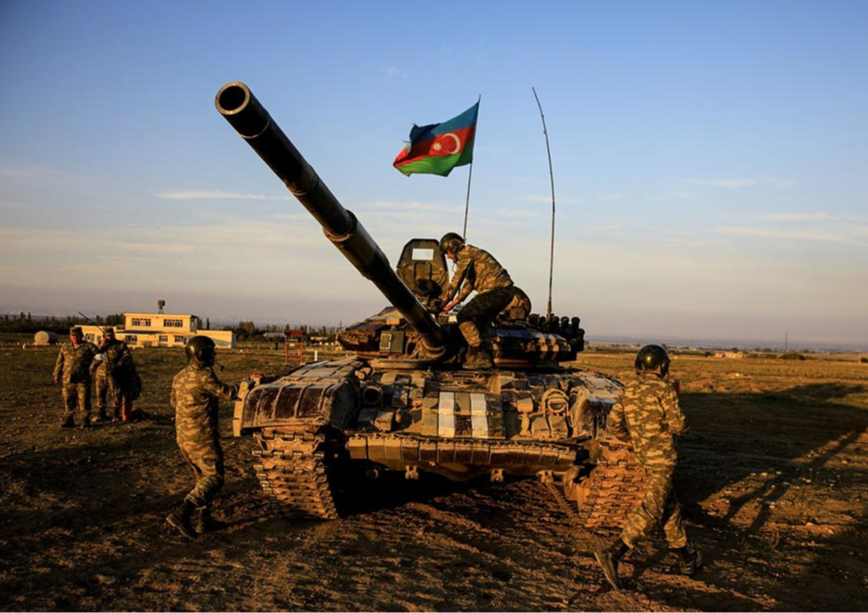
Armenia and Azerbaijan have disputed over the control of the Nagorno-Karabakh (also known as Artsakh in Armenia) region for at least the past three decades. Historically, there is evidence to suggest that Nagorno-Karabakh with its majority Armenian population and vast swathes of Armenian cultural heritage has been an integral part of historic Armenia. Yet Baku has been laying claims over the disputed territory since it lies within the geographical setting of Azerbaijan. Nagorno-Karabakh region was governed, at least until September last year, by a separatist government which was unrecognised at the international level. So far, the two nation-states have confronted each other in three violent conflicts. After the 24-hour skirmish last September in the Nagorno-Karabakh region, what remains underexplored is the impact of the fall of Nagorno-Karabakh, possibly giving rise to a new geopolitical order in the Caucasus and beyond.
Azerbaijan’s takeover of Artsakh: A new geopolitical order?
With the Azeri takeover of Nagorno-Karabakh region there has been more attention directed towards Zangezur, a remote yet strategic region under the control of Armenian authorities, along a 40-mile border it shares with Iran. A Soviet-era obsolete railroad in the region, now reimagined as the Zangezur corridor, is envisaged to connect Azerbaijan to Nakhchivan, a landlocked exclave of Azerbaijan separated from the rest of the country by Armenian territory. The region is significant to both Azerbaijan and Türkiye as the Zangezur corridor would form a strategic transport route connecting Baku to Kars via Armenia in proximity to the Yerevan-Tehran border. While Türkiye could view Azerbaijan’s takeover of Nagorno-Karabakh as its way forward to (re)launching the Zangezur corridor, it could have far-reaching consequences for the geopolitics in the Caucasus region. The project, Iran fears, might block its border with Armenia and as a corollary, it has clearly indicated that Azerbaijan’s effort to take over Zangezur would ostensibly trigger a military response, naturally drawing in Türkiye—a political ally of Azerbaijan.
The region is significant to both Azerbaijan and Türkiye as the Zangezur corridor would form a strategic transport route connecting Baku to Kars via Armenia in proximity to the Yerevan-Tehran border.
Zangezur also offers a viable opportunity for Türkiye to strengthen its energy connectivity with Azerbaijan. Within a week after the takeover of Artsakh, Azerbaijan and Türkiye launched the construction of a Nakhchivan gas pipeline. This pipeline is envisaged to run 50 miles between Igdir, Türkiye, across the Türkiye-Azerbaijan border, and a further 11 miles into Nakhchivan. While Nakhchivan is currently dependent on Iran for its oil supplies, the Nakhchivan gas pipeline would allow Azerbaijan to be its natural gas provider, thereby facilitating the Azeri and Turkic vision of the Zangezur corridor as an ambitious energy transit route. The corridor, if completed, could ostensibly strengthen commercial as well as diplomatic ties between Türkiye and Azerbaijan via Nakhchivan. While it remains unclear whether the Zangezur corridor would imply a full-on corridor through Armenian territory that is beyond Armenian sovereignty, it could trigger a new conflict in the region, with a strong potential to disrupt the Eurasian energy markets.
The existence of oil in Azerbaijan has been one of the factors driving the international community’s interest in the South Caucasus. For instance, any further escalation of the conflict in the South Caucasus region could apparently disrupt oil and gas exports from Azerbaijan to Europe, more so amid the ongoing war between Russia and Ukraine. Different political incentives are therefore at stake in the South Caucasian crisis. While on one hand, Russia has been committed by treaty to defend Armenia (later upgraded via Extended Defence Pact signed in 2010) in the instance of military escalation, Türkiye has historically pledged allegiance to Azerbaijan. In the past, the United States (US) government also had to accommodate conflicting interests—its desire to respond to its own American-Armenian community, and its domestic objective to secure alternative oil pipeline routes, concentrating Azerbaijan’s Caspian Sea oil reserves. Thus, any crisis in the South Caucasus would not only involve active actors from Armenia and Azerbaijan but also involve the Turks, Iranians, Russians, Americans, and Europeans and in particular the French as critical passive actors in the region.
While Nakhchivan is currently dependent on Iran for its oil supplies, the Nakhchivan gas pipeline would allow Azerbaijan to be its natural gas provider, thereby facilitating the Azeri and Turkic vision of the Zangezur corridor as an ambitious energy transit route.
Russian disaster: An opportunity for China’s BRI
Russia’s end goal in the post-Soviet political landscape, for as long as the past three decades, has been to reunite and reintegrate the former Republics of the erstwhile USSR, at least politically. However, it has also been in Russia’s geopolitical interest to have multiple frozen conflicts in its periphery to prevent the further Euro-Atlantic integration of countries in the regions such as the Caucasus and Moldova, among others. For instance, in the Moldova-Transnistria conflict, Moscow’s approach had been to prevent Moldova from joining NATO and the European Union. With the Nagorno-Karabakh conflict, the approach was to keep the region destabilised and dependent on Russia, thereby precluding the possibility of better diplomatic ties with the West. The Nagorno-Karabakh conflict had indeed emerged as one of the several frozen conflicts in the post-Soviet space, undermining regional stability.
Instinctively Russia had been reluctant to let the war over Nagorno-Karabakh and now unarguably the controversy over Zangezur become a full-fledged crisis as it could further mar its long political standing both in the Caucasus and the entire post-Soviet space. The experience with Belarus and the ongoing war in Ukraine indicates its leadership in the region, including the Caucasus is extremely threatened. Armenia’s recent joint military exercises with the US and ratification of the Rome Statute of the International Criminal Court (ICC), which demands the arrest of Vladimir Putin clearly indicates the same. Furthermore, the war in Ukraine has deeply undermined the perception of Russia as a historic security provider in the post-USSR region. The fall of the Nagorno-Karabakh region and the ongoing Armenian as well as Georgian rhetoric over NATO and EU aspirations clearly represent a geopolitical defeat for Russia—a blow to its political image.
Armenia’s recent joint military exercises with the US and ratification of the Rome Statute of the International Criminal Court (ICC), which demands the arrest of Vladimir Putin clearly indicates the same.
With the demise of Nagorno-Karabakh, international talks over its social and economic integration to Azerbaijan ongoing and the conversations over the status of the Zangezur corridor (re)surfacing, China has emerged as a clear-cut political beneficiary of the ongoing crisis in the South Caucasus, particularly for its Belt Road Initiative. Beijing has been building transport routes to Europe that could bypass Russia. One of these routes crosses the Caspian Sea from Kazakhstan to Azerbaijan and onward to Georgia, Türkiye and ultimately Europe. The corridor between Nakhchivan and Azerbaijan could offer Beijing another route to Europe in the South Caucasus: the one via Georgia plus another one across southern Armenia and Nakhchivan. Any economic cooperation and the possibility of linking the Nakhichevan exclave through Armenian territory will eventually connect China to Türkiye and Central Asia through Azerbaijan as well as the Caspian Sea—an essential link for the viability of the BRI.
The linkages with the Caspian Sea could eventually provide a direct route to China into Pakistan and India (via its long-standing rival neighbour). Thus, if materialised, China’s political gain from Artsakh’s takeover by Azerbaijan, could in turn possibly have some serious geopolitical implications for India. With Russia losing its hold not only in the Caucasus but in the wider post-USSR nation-states world as the peace broker (partly marred by the ongoing war in Ukraine), Iran threatening Baku with military resistance, China is potentially emerging as one of the top beneficiaries of the Nagorno-Karabakh’s demise. Amid this new geopolitical order on the rise, the West, on the other hand, is still caught up in its political dilemma over whether to balance the energy ties with Baku or address the grievances of the Western Armenian community.
Sabine Ameer is a doctoral researcher in Politics and International Relations at the University of Glasgow, United Kingdom.
The views expressed above belong to the author(s). ORF research and analyses now available on Telegram! Click here to access our curated content — blogs, longforms and interviews.




 PREV
PREV


